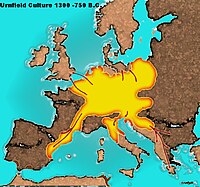Urnfield culture

Imagine a long, long time ago, when there were no big cities or fancy buildings like we have today. People lived in small groups and moved around looking for food and shelter. One group of people that lived in Europe during a time we call the Bronze Age are called the Urnfield culture.
The Urnfield culture got their name because they used to bury their dead in urns, big pots made of clay or sometimes bronze. They believed that the urns would keep their loved ones safe and that they could still care for them even after they had died.
But the Urnfield culture wasn't just known for burying their dead in urns. They were also really good at making tools and weapons out of bronze, a special metal that was very valuable back then. They made things like swords, axes, and spears that helped them hunt for food and protect their families.
The Urnfield culture also had some really interesting beliefs about the afterlife. They believed that after they died, they would go to a special place called the "Land of the Dead." To help them on their journey, they would often place special objects in their graves, like weapons or jewelry.
They were also very skilled farmers and grew crops like wheat and barley. They would use these crops to make delicious bread that they would share with their families and friends.
Today, we can learn a lot about the Urnfield culture by studying the artifacts they left behind, like the urns they used to bury their dead and the weapons they made. They might have lived a long time ago, but their culture and traditions have left a lasting impact on our world today.
The Urnfield culture got their name because they used to bury their dead in urns, big pots made of clay or sometimes bronze. They believed that the urns would keep their loved ones safe and that they could still care for them even after they had died.
But the Urnfield culture wasn't just known for burying their dead in urns. They were also really good at making tools and weapons out of bronze, a special metal that was very valuable back then. They made things like swords, axes, and spears that helped them hunt for food and protect their families.
The Urnfield culture also had some really interesting beliefs about the afterlife. They believed that after they died, they would go to a special place called the "Land of the Dead." To help them on their journey, they would often place special objects in their graves, like weapons or jewelry.
They were also very skilled farmers and grew crops like wheat and barley. They would use these crops to make delicious bread that they would share with their families and friends.
Today, we can learn a lot about the Urnfield culture by studying the artifacts they left behind, like the urns they used to bury their dead and the weapons they made. They might have lived a long time ago, but their culture and traditions have left a lasting impact on our world today.
Related topics others have asked about:
